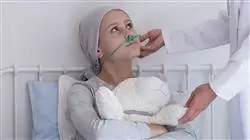University certificate
The world's largest faculty of medicine”
Introduction to the Program
This Postgraduate certificate in Childhood Cancer will generate a sense of security in the performance of your profession, which will help you to offer a quality service to your patients"

Diseases that occur at an early age, those affecting children and young people are unique and different from tumors suffered by adults. Although the figures are optimistic in the prognosis and treatment of oncological diseases affecting children, since only 2% of cancers occur at this stage of life, it is necessary to have professionals specialized in treating childhood cancer, adapting to the real needs of the youngest.
This Postgraduate certificate in Childhood Cancer offers the possibility of specializing in the treatment of cancer in children and young people in order to acquire the excellent professional skills to treat specific diseases that occur at very early ages.
The specialization will allow the development of competencies, skills and abilities for the performance of the profession, taking into account that the patients are children who require different attention and treatment than adults.
Update your knowledge through the Postgraduate certificate in Childhood Cancer program"
This Postgraduate certificate in Childhood Cancer contains the most complete and up-to-date scientific program on the market. The most important features of the program include:
- Development of more than 75 case studies presented by experts in childhood cancer
- The graphic, schematic, and eminently practical contents with which they are created provide scientific and practical information on the disciplines that are essential for professional practice
- News on Childhood Cancer
- It contains practical exercises where the self-evaluation process can be carried out to improve learning
- With special emphasis on innovative methodologies in Childhood Cancer
- All of this will be complemented by theoretical lessons, questions to the expert, debate forums on controversial topics, and individual reflection assignments
- Content that is accessible from any fixed or portable device with an Internet connection
This course may be the best investment you can make in the selection of a refresher program for two reasons: in addition to updating your knowledge in childhood cancer, you will obtain a Postgraduate certificate from TECH"
It includes in its teaching staff professionals belonging to the field of childhood cancer who pour into this specialization the experience of their work, in addition to recognized specialists belonging to reference societies and prestigious universities.
The multimedia content developed with the latest educational technology will provide the professional with situated and contextual learning, i.e., a simulated environment that will provide immersive training program to train in real situations.
The design of this program is based on problem-based learning, by means of which the professional must try to solve the different professional practice situations that arise throughout the course. For this purpose, the professional will be assisted by an innovative interactive video system developed by renowned experts in the field of Childhood Cancer and with great medical experience.
Increase your confidence in decision making by updating your knowledge through this course"

Take the opportunity to learn about the latest advances in Childhood Cancer, and improve the specialization of your students"
Why study at TECH?
TECH is the world’s largest online university. With an impressive catalog of more than 14,000 university programs available in 11 languages, it is positioned as a leader in employability, with a 99% job placement rate. In addition, it relies on an enormous faculty of more than 6,000 professors of the highest international renown.

Study at the world's largest online university and guarantee your professional success. The future starts at TECH”
The world’s best online university according to FORBES
The prestigious Forbes magazine, specialized in business and finance, has highlighted TECH as “the world's best online university” This is what they have recently stated in an article in their digital edition in which they echo the success story of this institution, “thanks to the academic offer it provides, the selection of its teaching staff, and an innovative learning method aimed at educating the professionals of the future”
A revolutionary study method, a cutting-edge faculty and a practical focus: the key to TECH's success.
The most complete study plans on the university scene
TECH offers the most complete study plans on the university scene, with syllabuses that cover fundamental concepts and, at the same time, the main scientific advances in their specific scientific areas. In addition, these programs are continuously being updated to guarantee students the academic vanguard and the most in-demand professional skills. In this way, the university's qualifications provide its graduates with a significant advantage to propel their careers to success.
TECH offers the most comprehensive and intensive study plans on the current university scene.
A world-class teaching staff
TECH's teaching staff is made up of more than 6,000 professors with the highest international recognition. Professors, researchers and top executives of multinational companies, including Isaiah Covington, performance coach of the Boston Celtics; Magda Romanska, principal investigator at Harvard MetaLAB; Ignacio Wistumba, chairman of the department of translational molecular pathology at MD Anderson Cancer Center; and D.W. Pine, creative director of TIME magazine, among others.
Internationally renowned experts, specialized in different branches of Health, Technology, Communication and Business, form part of the TECH faculty.
A unique learning method
TECH is the first university to use Relearning in all its programs. It is the best online learning methodology, accredited with international teaching quality certifications, provided by prestigious educational agencies. In addition, this disruptive educational model is complemented with the “Case Method”, thereby setting up a unique online teaching strategy. Innovative teaching resources are also implemented, including detailed videos, infographics and interactive summaries.
TECH combines Relearning and the Case Method in all its university programs to guarantee excellent theoretical and practical learning, studying whenever and wherever you want.
The world's largest online university
TECH is the world’s largest online university. We are the largest educational institution, with the best and widest online educational catalog, one hundred percent online and covering the vast majority of areas of knowledge. We offer a large selection of our own degrees and accredited online undergraduate and postgraduate degrees. In total, more than 14,000 university degrees, in eleven different languages, make us the largest educational largest in the world.
TECH has the world's most extensive catalog of academic and official programs, available in more than 11 languages.
Google Premier Partner
The American technology giant has awarded TECH the Google Google Premier Partner badge. This award, which is only available to 3% of the world's companies, highlights the efficient, flexible and tailored experience that this university provides to students. The recognition as a Google Premier Partner not only accredits the maximum rigor, performance and investment in TECH's digital infrastructures, but also places this university as one of the world's leading technology companies.
Google has positioned TECH in the top 3% of the world's most important technology companies by awarding it its Google Premier Partner badge.
The official online university of the NBA
TECH is the official online university of the NBA. Thanks to our agreement with the biggest league in basketball, we offer our students exclusive university programs, as well as a wide variety of educational resources focused on the business of the league and other areas of the sports industry. Each program is made up of a uniquely designed syllabus and features exceptional guest hosts: professionals with a distinguished sports background who will offer their expertise on the most relevant topics.
TECH has been selected by the NBA, the world's top basketball league, as its official online university.
The top-rated university by its students
Students have positioned TECH as the world's top-rated university on the main review websites, with a highest rating of 4.9 out of 5, obtained from more than 1,000 reviews. These results consolidate TECH as the benchmark university institution at an international level, reflecting the excellence and positive impact of its educational model.” reflecting the excellence and positive impact of its educational model.”
TECH is the world’s top-rated university by its students.
Leaders in employability
TECH has managed to become the leading university in employability. 99% of its students obtain jobs in the academic field they have studied, within one year of completing any of the university's programs. A similar number achieve immediate career enhancement. All this thanks to a study methodology that bases its effectiveness on the acquisition of practical skills, which are absolutely necessary for professional development.
99% of TECH graduates find a job within a year of completing their studies.
Postgraduate Certificate in Childhood Cancer
Nowadays, childhood cancer represents one of the main causes of death in the pediatric population. That is why, increasingly, medicine is focusing on the study and treatment of this pathology. In this sense, TECH offers the Postgraduate Certificate in Childhood Cancer, a great opportunity for those medical professionals who wish to deepen their knowledge of this disease and offer a comprehensive approach to pediatric oncology patients. This online study program, without a doubt, is an excellent option to specialize in the area of pediatric oncology, as it provides quality theoretical and practical training in the diagnosis, treatment and follow-up of pediatric cancer. In addition, the Postgraduate Certificate offers a comprehensive view of the various medical specialties involved in the treatment of the pediatric oncology patient, including oncology, hematology, radiology, surgery, pediatrics and Nursing, among others.
Stand out as an expert in pediatric cancer
This Postgraduate Certificate is aimed at physicians specializing in pediatrics, oncology, hematology, radiology, surgery, among others. Participants can acquire specific skills and knowledge that will enable them to improve their performance in the workplace, as well as improve the care and quality of life of pediatric oncology patients. TECH, as a leading university in distance education, offers a state-of-the-art online study methodology that guarantees comprehensive and up-to-date training. Students will have access to an online platform that will allow them to interact with the teaching team and other students, as well as to access didactic resources such as videos, presentations, recommended readings, discussion forums, evaluations and internships. The Postgraduate Certificate in Pediatric Cancer is an excellent opportunity for those medical professionals seeking to specialize in this area and offer a comprehensive approach to pediatric oncology patients. The knowledge acquired will allow participants to improve their work performance and provide quality care to patients and their families. Do not miss the opportunity to become an expert in childhood cancer with TECH!







